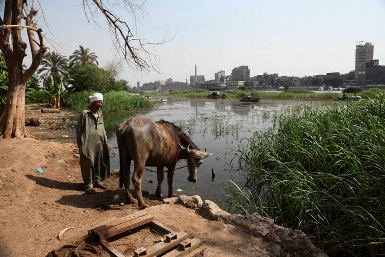Tripartite committee on Ethiopia’s dam to decide on contentious points
July 22, 2015 (KHARTOUM) – Egypt’s minister of water resources, Hossam Moghazy, said the meeting of the tripartite technical committee on Ethiopia’s Grand Ethiopian Renaissance Dam (GERD) would decide on his country’s reservations to the proposals submitted by the consulting firms.

The three countries had previously formed a committee to select a consultancy firm to assess the impact of the dam on Sudan and Egypt. Four consultancy firms from France, Australia and Netherlands had been short-listed initially and invited to submit their proposals.
The multi-billion dollar dam is being constructed on the Blue Nile, about 20 kilometres from the Sudanese border, and has a capacity of 74 billion cubic meters, and is expected to generate electrical power of up to 6,000 megawatts.
The Khartoum meeting would discuss pending issues from the previous meeting which was held in Cairo last month regarding the potential impact of GERD on the downstream countries (Sudan and Egypt) besides the implementation of the technical studies according to the timetable agreed upon on the roadmap approved by the three nations.
In his address during the opening session of the meeting, Sudan’s minister of water resources and electricity, Muataz Musa, voiced confidence that the meeting would be held in an atmosphere of mutual understanding and consensus, stressing it would achieve its objectives.
It is worth noting that the leaders of Sudan, Egypt and Ethiopia last March signed a declaration of principles on GERD in Khartoum in preparation for negotiations on the details of the giant dam.
The Egyptian minister for his part said the French and Dutch companies that were selected to conduct studies on the social, financial and hydraulic impact of the dam on the three countries have submitted their proposals during the previous meeting in Cairo, noting the current meeting would decide on some reservations made by the Egyptian side on the proposals.
He pointed to two points of contention including the participation rate of the two companies and their technical views, saying 70% of the work has been assigned to the French company while 30% has been given to the Dutch company.
“Were the participation rates [of the two companies] based on the work hours or the financial reward?” he wondered.
The Egyptian minister added they also made a reservation pertaining to the mathematical models provided by the two companies.
He stressed the need to resolve all points of contention during this meeting and to agree on all fine details in order to allow the consulting firm and the secondary firm to start their work.
Moghazi disclosed they submitted two technical studies to Sudan and Ethiopia focusing on the impact of GERD on Egypt’s water resources, saying they reached agreement on some of the technical issues while others will be submitted to next ministerial meeting.
International experts in the field of dam safety, water resources and environment from Germany, France, Britain and South Africa along with representatives from the three countries had submitted recommendations in May 2013 after a year and a half of field visits to the dam and scrutinizing all design documents and dam studies.
But Egypt rejected the report and other studies submitted by the Ethiopian side.A year ago it also issued a report claiming that the dam could shrink Egypt’s share of Nile water by 12 billion cubic meters.
(ST)
